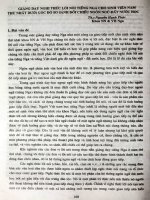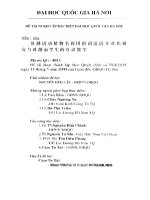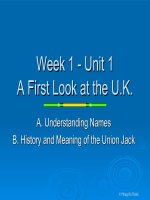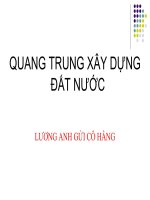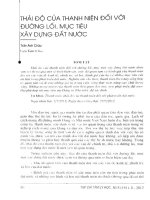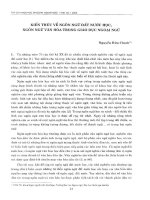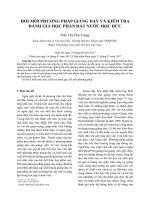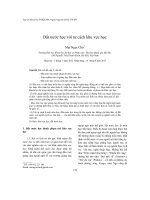dat nuoc hoc anh
Bạn đang xem bản rút gọn của tài liệu. Xem và tải ngay bản đầy đủ của tài liệu tại đây (1.36 MB, 68 trang )
B
y
P
h
a
m
T
h
i
T
h
a
n
h
T
h
u
y
B
Week 8
British
Politic
al
system
outline
British
Politic
al
System
Political
life
The
Monarchy
The
Government
The
Parliament
Elections
By Pham Thi Thanh Thuy B
outline
1. The party
system
2. The public
attitude to
politics
3. The style of
democracy
4. The
constitution
5. The style of
politics
Political
life
The
Monarchy
The
Government
The
Parliament
Elections
By Pham Thi Thanh Thuy B
The party system
A two party system–
The party system
The party that wins
the majority of seat
forms the Gov. and
its leaders (= MPs)
The parties choose candidates in elections
(independent candidates are rarely elected)
The largest minority
party = opposition
(
criticize the party
running the country
)
Without agreement between the political parties,
the British parliamentary system would break down
Public attitude to
politicsLack of
trustworthiness
Do expect them
to be dishonest
Don t welcome ’
corruptions
However
1
st
rule in politic
NEVER BELIEVE ANYTHING
UNTIL IT S BEEN OFFICIALLY DENIED’
Lack of
enthusiasm
Names of
their local MPs
Names of important
Gov. ministers
Are
unknown
Style of democracy
Have high respect for the law
•
Little systematic law breaking by large number
•
Not invading taxation
Comparatively unenthusiastic about
making new laws
•
Best to do without them
•
Few rules and regulations in many aspects (for
Government and individuals)
Relationship between Individual and the State
Both s h o u ld leav e each o ther alone
Style of democracy
Individual
Government
Not breaking the
law and paying taxes
Not being obliged
to vote at elections
Not having to
register their change
of address when
moving houses
Having less participation
by ordinary citizens in
governing and law making
No concept of By the people“ ”
Not having to ask the
people for a change in law
Not having to have a
special vote in Par. With a
high proportion of MPs in
favour
Style of democracy
People choose who is to
govern the country and let
them get on with it
The constitution
Is a constitutional monarchy
–
governed by a King or Queen
–
accepts the advice of Parliament
Is also parliamentary democracy
–
Government controlled by Parliament
–
Official head of state or President has
little real power
H
o
w
e
v
e
r
Doesn’t have a “constitution” at all
The constitution
No written law:
-
Says anything about who can be the MP
and what his powers are
-
asserts people s rights’
The style of politics
Political life is still influenced by the traditional
British respect for privacy and love of secrecy
Comparatively informal
Important decisions are to be taken at lunch, over
dinner, or in chance encounters in the corridors of
power
MPs have a habit of co-operation among politicians
of different parties
- Being good friends
- Little fighting about how political business is
to be conducted fairly
1. The appearance
2. The reality
3. The role of the
monarch
4. The value of
the monarch
5. The future of
the monarch
outline
Political
life
The
Monarchy
The
Government
The
Parliament
Elections
By Pham Thi Thanh Thuy B
The appearance
In written law, the Queen has absolute power to:
Choose the Prime Minister
Dismiss ministers and governments
Dissolve Parliament
Refuse to agree to legislation
passed by Parliament
Dismiss the governments of
other countries of which she is
monarch
Embody the law in the courts
Can do nothing that is legally wrong
In reality: Different
Can t choose anyone she likes to be P.M’
P.M decides the other government ministers
P.M requests a dissolution of Gov.
The Royal assent to a bill passed by
Parliament is automatic
The reality
The Queen has almost no power at all
When she opens Parliament each year,
the speech she makes has been written
for her
•
she makes no secret of the fact
•
She reads word for word
•
She might ask the Gov. minister to
change the wording
The reality
The Queen has almost no power at all
Can t stop the Gov. ’
going ahead with
any of its politics
The Role of the monarch
Personal
embodiment
of the Gov
A final
check on a
Gov
Plays
practical
role
The Monarch
can refuse the
royal assent
for a bill to
become law
and the
request of
a dissolution
of Parliament
People can be as critical as they like about the real
Gov without being accused of being unpatriotic
Perform the
ceremonial
duties
the real G
has more time
to get on with
the actual job
of running
the country
The Value of the monarch
Important to the economy
Popular with the
majority of the
British people
Make up for the
lack of colour and
ceremony
A source of entertainment
Future of the monarchy
•
Not a political issue
•
The Q= popular
•
Prestige of Royal
family has lowered
due to various
marital problems
Changing Guard at Windsor Castle
Future of royal style
a little grand,
a little less distant
1. The
Government
Structure
2. Collective
Responsibility
3. The cabinet
4. The Prime
Minister
5. The civil
service
6. Central and
local
government
outline
Political
life
The
Monarchy
The
Government
The
Parliament
Elections
By Pham Thi Thanh Thuy B
Government structure
•
The Government includes:
–
The Prime Minister: most powerful
–
20 MPs:
•
From the House of Common and belong to the
same political party
•
Heads of the Gov. Departments (Minister of )
•
Appointed by the monarch (on the advice of
the PM)
•
Take on various responsibilities of managing
Parliament but have COLLECTIVE
RESPONSIBILITY
Collective responsibility
All share the responsibilities for every
policy made by Government
No member of
the Gov. can
criticize Gov.
policy in public or
must resign to do so
Having different
opinions, they must
keep these private
The Cabinet
•
Which?
•
Who?
•
Where?
•
When?
•
What?
•
How?
The Cabinet
Which?
Who?
Where?
The committee at
the centre of the
British political
system and is the
supreme decision-
making body in
government
Leading politicians in
the governing party
I
n
t
h
e
C
a
b
i
n
e
t
r
o
o
m
i
n
D
o
w
n
i
n
g
S
t
r
e
e
t
T
a
k
e
d
e
c
i
s
i
o
n
s
a
b
o
u
t
n
e
w
p
o
l
i
c
i
e
s
,
t
h
e
i
m
p
l
e
m
e
n
t
a
t
i
o
n
o
f
e
x
i
s
t
i
n
g
p
o
l
i
c
i
e
s
a
n
d
t
h
e
r
u
n
n
i
n
g
o
f
t
h
e
v
a
r
i
o
u
s
G
o
v
.
D
e
p
a
r
t
m
e
n
t
The Cabinet
When?
What?
How?
E
v
e
r
y
T
h
u
r
s
d
a
y
-
The PM chairs the meeting
-
Who says what is secret
-
Reports are made and circulated to Gov. Depart.
-
Gov. Depart. summarizes the topic discussed
and decisions taken

